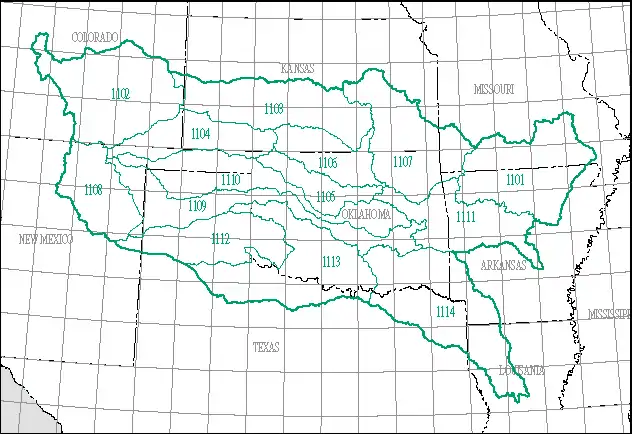The Arkansas–White–Red water resource region is one of 21 major geographic areas, or regions, in the first level of classification used by the United States Geological Survey to divide and sub-divide the United States into successively smaller hydrologic units. These geographic areas contain either the drainage area of a major river, or the combined drainage areas of a series of rivers.[1][2]
The Arkansas–White–Red region, which is listed with a 2-digit hydrologic unit code (HUC) of 11, has an approximate size of 247,988 square miles (642,290 square kilometers), and consists of 14 subregions, which are listed with the 4-digit HUCs 1101 through 1114.[3]
This region includes the drainage of the Arkansas, White, and Red River Basins above the points of highest backwater effect of the Mississippi River. Includes all of Oklahoma and parts of Arkansas, Colorado, Kansas, Louisiana, Missouri, New Mexico, and Texas.[3]

List of water resource subregions
| Subregion HUC[4] | Subregion Name[4] | Subregion Description[3] | Subregion Location[4] | Subregion Size[4] | Subregion Map |
|---|---|---|---|---|---|
| 1101 | Upper White subregion | The White River Basin above and including the Little Red River Basin to the point of highest backwater effect of the Mississippi River. | Arkansas and Missouri. | 22,200 sq mi (57,000 km2) |  HUC1101 |
| 1102 | Upper Arkansas subregion | The Arkansas River Basin above Its intersect with the Colorado-Kansas state Line. | Colorado, Kansas, and New Mexico. | 24,600 sq mi (64,000 km2) |  HUC1102 |
| 1103 | Middle Arkansas subregion | The Arkansas River Basin below its intersect with the Colorado-Kansas state line to and including the Walnut River Basin, including the Whitewoman Creek closed basin. | Colorado and Kansas. | 20,200 sq mi (52,000 km2) |  HUC1103 |
| 1104 | Upper Cimarron subregion | The Cimarron River Basin from its headwaters to the river's most downstream intersect with the Kansas-Oklahoma state line, including the Bear Creek closed basin. | Colorado, Kansas, New Mexico, and Oklahoma. | 12,000 sq mi (31,000 km2) |  HUC1104 |
| 1105 | Lower Cimarron subregion | The Cimarron River Basin below the river's most downstream intersect with the Kansas-Oklahoma state line to the confluence with the Arkansas River, including that portion inundated by Keystone Reservoir. | Kansas and Oklahoma. | 7,050 sq mi (18,300 km2) |  HUC1105 |
| 1106 | Arkansas–Keystone subregion | The Arkansas River Basin below the Walnut River Basin to Keystone Dam, excluding the Cimarron River Basin. | Kansas and Oklahoma. | 9,750 sq mi (25,300 km2) |  HUC1106 |
| 1107 | Neosho–Verdigris subregion | The Neosho and Verdigris River Basins. | Arkansas, Kansas, Missouri, and Oklahoma. | 20,500 sq mi (53,000 km2) |  HUC1107 |
| 1108 | Upper Canadian subregion | The Canadian River Basin above its intersect with the New Mexico-Texas state line. | Colorado and New Mexico. | 12,500 sq mi (32,000 km2) |  HUC1108 |
| 1109 | Lower Canadian subregion | The Canadian River Basin below its intersect with the New Mexico-Texas state line to the confluence with the Arkansas River, including that portion inundated by Eufaula Lake and Robert S. Kerr Reservoir, but excluding the North Canadian River Basin. | New Mexico, Oklahoma, and Texas. | 16,800 sq mi (44,000 km2) |  HUC1109 |
| 1110 | North Canadian subregion | The North Canadian River Basin, including that portion inundated by Eufaula Lake. | Kansas, New Mexico, Oklahoma, and Texas. | 17,500 sq mi (45,000 km2) |  HUC1110 |
| 1111 | Lower Arkansas subregion | The Arkansas River Basin below Keystone Dam to the point of highest backwater effect of the Mississippi River below Lock and Dam 4 on the Arkansas River, but excluding the Canadian, Neosho, and Verdigris River Basins. | Arkansas and Oklahoma. | 15,600 sq mi (40,000 km2) |  HUC1111 |
| 1112 | Red headwaters subregion | The North Fork Red River, Prairie Dog Town Fork Red River, and the Salt Fork Red River Basins. | New Mexico, Oklahoma, and Texas. | 14,600 sq mi (38,000 km2) |  HUC1112 |
| 1113 | Red–Washita subregion | The Red River Basin above Denison Dam, excluding the North Fork Red River, Prairie Dog Town Fork Red River, and the Salt Fork Red River Basins. | Oklahoma and Texas. | 24,600 sq mi (64,000 km2) |  HUC1113 |
| 1114 | Red–Sulphur subregion | The Red River Basin below Denison Dam to and including the Bayou Rigolette Basin at the point of highest backwater effect of the Mississippi River. | Arkansas, Louisiana, Oklahoma, and Texas. | 27,600 sq mi (71,000 km2) |  HUC1114 |
See also
References
- ↑ "Science in Your Watershed - Locate Your Watershed". USGS. Retrieved 2016-10-12.
 This article incorporates text from this source, which is in the public domain.
This article incorporates text from this source, which is in the public domain. - ↑ "Hydrologic Unit Maps". USGS. Retrieved 2016-10-12.
 This article incorporates text from this source, which is in the public domain.
This article incorporates text from this source, which is in the public domain. - 1 2 3 "Boundary Descriptions and Names of Regions, Subregions, Accounting Units and Cataloging Units". USGS. Retrieved 2016-10-12.
 This article incorporates text from this source, which is in the public domain.
This article incorporates text from this source, which is in the public domain. - 1 2 3 4 McManamay RA, Bevelhimer MS, Kao SC, Yaxing W, Martinez-Gonzalez M, Samu N (2013). "National Hydropower Asset Assessment Environmental Attribution". USGS-Oak Ridge National Laboratory. Retrieved 2016-10-12.
 This article incorporates text from this source, which is in the public domain.
This article incorporates text from this source, which is in the public domain.